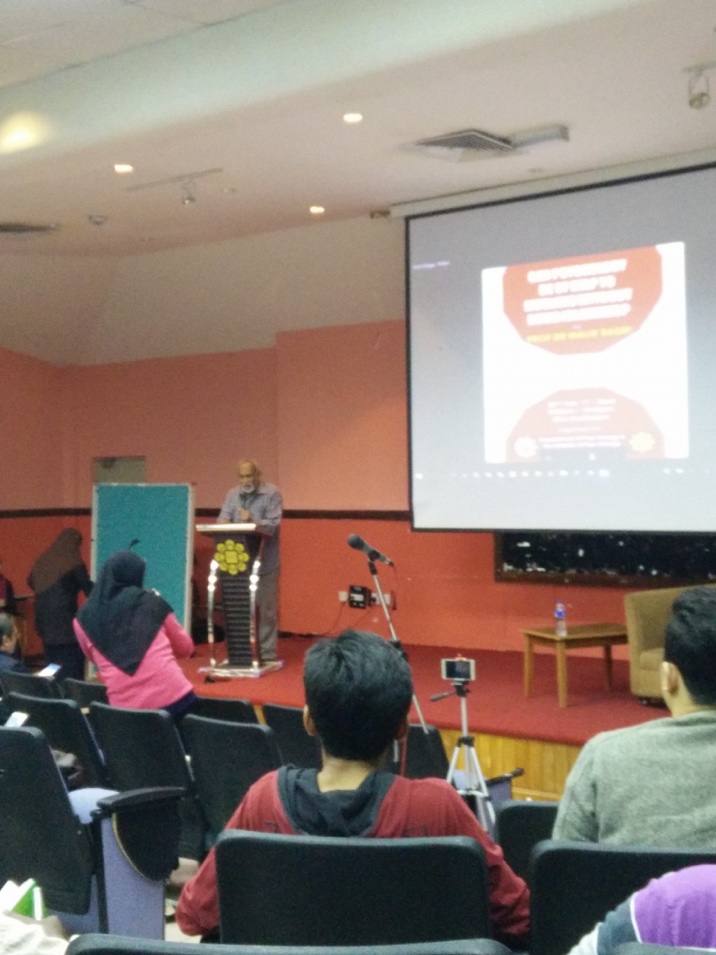By Mohd Azwan Abdul Rahman
As a student of Psychology in the International Islamic University Malaysia, we have learnt much from Prof. Malik Badri who was a professor in the Department of Psychology, Kulliyyah of Islamic Revealed Knowledge and Human Sciences, and later the Chair of Ibnu Khaldun in the Kulliyyah.
I had the privilege of learning from him in several talk sessions, one of which was his lecture entitled “Can Psychology Be of Help to Muslims Without Being Islamised?” held on 22 February 2017. Here are invaluable notions that I found very important for us to understand the field better, and to correct what we had learned about Psychology so far.

1. Psychology is not a field of science as understood in the natural sciences field which is based upon the standard methodology of positivism. This notion is debatable in Philosophy of Science and Social Sciences with much deeper discussion needed to delve to these present-day with the challenge of postmodernism. On its subject matter, Psychology is a body of knowledge that concerns the human mind, which by its nature comprised of psychological variables that are very elusive that cannot be exactly studied in the same way as in Physic or Biology. In other words, Prof. Malik highlighted, among others, the issues of reductionism in the field of Psychology, that is reducing the human being as a mechanical behavioural being. Therefore, the tendency to focus on empirical methods only (as understood by modern secular science) in the study of human being, should be revised.
2. Psychotherapy and Counselling are not on the ground of science*. In fact, psychotherapy has been criticised a lot even in the modern western scientific traditions, while in the third world countries, mostly it is being blindly celebrated and glorified even by Muslims psychologists, sadly. There is an abundance of evidence of the nonsensical arguments in psychotherapy, and there is a book that discusses how Sigmund Freud conceptualised his idea under the influence of cocaine, until he emphasised too much on unconscious sexual impulses that play a powerful role in controlling our consciousness. Even his case study has been refuted and found as not true (for example, the case of Anna).
3. Psychology, as explained in all textbooks across the world, proudly presents itself as a body of science which divorces itself from the field of Philosophy after Wilhelm Wundt established a Psychology laboratory in Leipzig. This is the most untrue “fact” that is taught to the whole Psychology students. In actual fact, Psychology has never detached from Philosophy, and in fact, all the psychological approaches have been influenced by and are based upon philosophical thought of its time. Today, however, all Psychology textbooks are being exported and taught in wholesale to every part of the world, including in Muslim countries like Malaysia, without being critically analysed as to whether its philosophical elements are against the Islamic worldview.
The most scientific level a Psychology subject can be is when it is combined with the study of pure sciences such as neuropsychology. Therefore, Psychology is a mixture of science and philosophy, the latter has been influenced much by the western-secular worldview. That is why it is very important for Muslims like us to critically analyse all the interpretations of psychological findings by subjecting them to the core philosophical arguments.
4. Prof. Malik read a sentence based on Sigmund Koch’s works: “Bulk of Psychology is a pseudo-knowledge with a difference and contradict (contradicting?) images of the nature of human being” i.e: Neuropsychologists who viewed human beings cognitively, psychotherapists who emphasised on unconscious sexual impulse, and behaviourists who emphasised environmental influence in controlling human beings on its stimulus-response theory. All these psychological views will eventually determine the theory on what Psychology is, and in turn, affect the psychological diagnosis and its therapy.
5. We should be able to differentiate between what is true and not true about psychological approaches and then adapt it based upon our cultural and religious principles. Prof. Malik shared his experience handling a case of a woman who admitted having phobias of ghosts. Based upon the modern-psychological treatment, she was required to undergo systematic desensitisation which would be a ridiculous thing to be implemented, so he (Prof. Malik) had referred the patient to a Shaykh, a Muallij (spiritual healer) who is the expert authority on that matter. Prof. Malik stressed how the introduction of Islamic elements helps in the therapy more than the conventional western psychological therapy.
Another example Prof. Malik gave is on measuring intelligence among children (i.e: in Sudan) by using a standardised intelligence test. The IQ test might be invalid in some cases due to barriers, for instance, the need of using a pen in scoring the test for the natives who do not possess the skills. While in reality, they might have a much higher score on the test compared to those who had the basic skills in writing using a pen.
6. Therefore, Psychology cannot be beneficial to Muslims unless it has been culturally adapted; and Islamised by subjecting its notions to its philosophical core.***
(Mohd Azwan Abdul Rahman, who identified himself as ˜Khadim of ‘ilm, is an alumnus of Psychology Department, KIRKHS. He graduated in 2012 and is currently at REAL International School)
